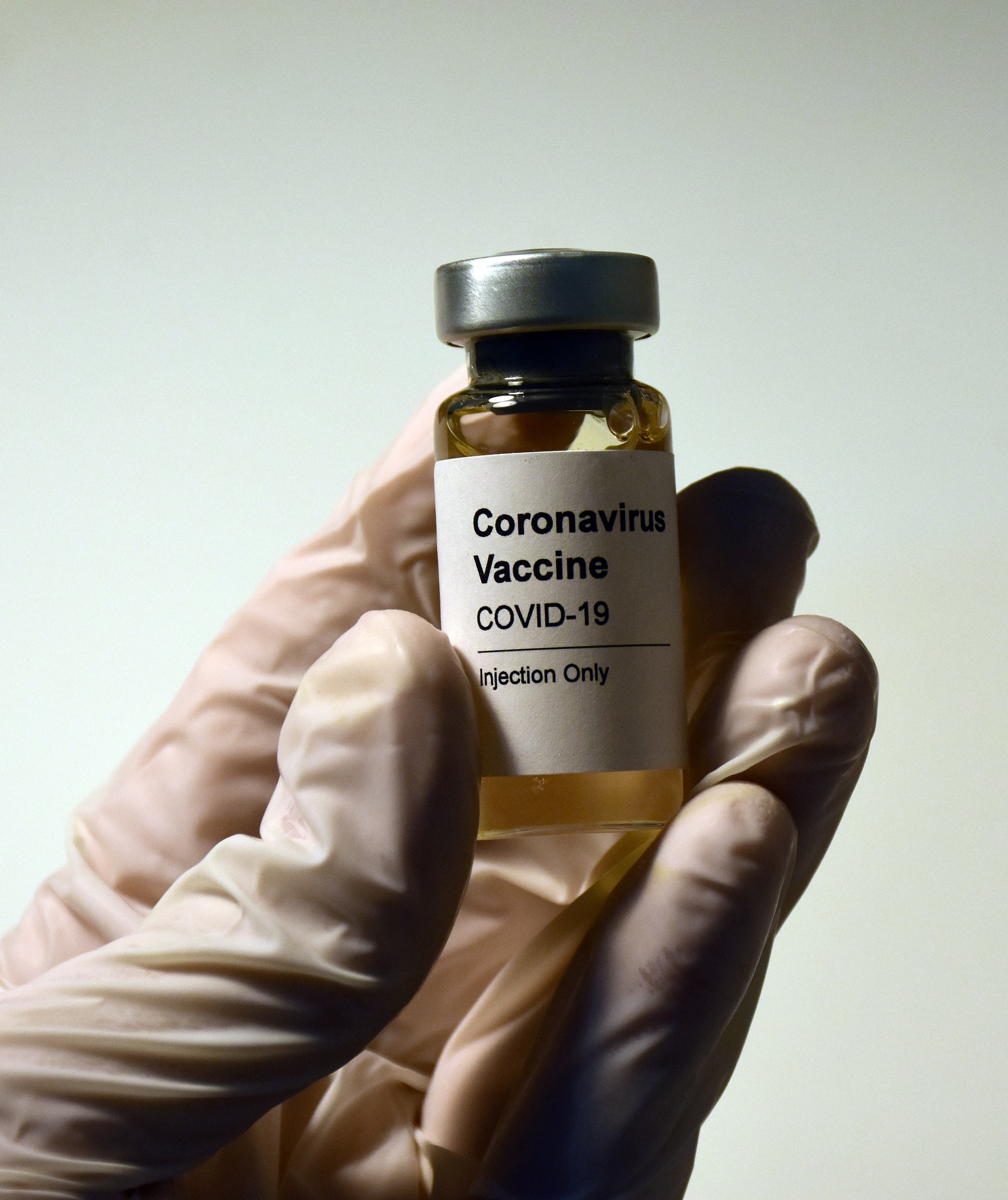The InVisionary
After nearly two years of tireless research and careful testing from scientists, Covid-19 vaccines are now widely available. InVision strongly recommends Covid-19 vaccines for our staff. If you have not yet received a Covid-19 vaccine dose, please schedule one today. We understand vaccine hesitancy; however, InVision’s Covid-19 Task Force aims to dispel myths and misinformation about vaccine efficacy and safety that perpetuate in online spaces.
The Task Force continues to monitor changes in mandates and other regulations concerning Covid-19. We encourage everyone at InVision to utilize the trusted resources in this article to learn about the vaccines and how they can help lead us out of the pandemic.
As more and more people become vaccinated against Covid-19, it makes it much harder for the disease to spread, effectively ending the pandemic.

Do not confuse an immune response generated by a vaccine with “natural immunity”.
Simply put, a Covid-19 vaccination is a far safer and more dependable way to build immunity to the disease. There are many variables to consider with infection and so-called “natural immunity”—such as illness severity and age—and you will become very sick (and possibly hospitalized) in the process. The potential side effects of a vaccine far outweigh the risk of severe illness (to yourself and others)—or even death—from Covid-19.
Importantly, Covid-19 vaccines have also been shown to offer additional protection to people who have already been infected in the past.
Still, experts are constantly learning more about Covid-19 and how vaccines perform. The CDC is committed to keeping the public informed as new evidence becomes available.
InVision highly recommends its DSPs receive a Covid-19 vaccine if they haven’t yet. As frontline workers, DSPs put themselves at risk daily by supporting the people we serve at their homes and in their communities. People with disabilities are classified as high-risk for developing severe illness, and our DSPs remain at risk through the nature of their work.
Unless you have experienced an allergic reaction to a mRNA vaccine, the CDC does not recommend the Johnson & Johnson vaccine. While the reported adverse effects of the Johnson & Johnson vaccine are rare, people who received it still required a booster vaccine from either Pfizer or Moderna to improve its efficacy.

Yes. Both Pfizer and Moderna are authorized by the U.S. Food and Drug Administration (FDA) and the CDC (Pfizer is fully approved by the FDA, and Moderna and other may receive the same designation in the near future—for now, they remain under Emergency Authorization) as fully safe and effective at preventing serious illness and death from Covid-19.
No ingredients in any of the available vaccines are dangerous, and they’re mostly made up of components found in the foods we eat. There’s no evidence to suggest vaccines have any effect on fertility in women or men, and they don’t alter DNA (mRNA vaccines deliver instructions to your body’s cells to start building protection against a specific virus). They also do not contain microchips or ingredients that would produce an electromagnetic field at the site of injection.
Vaccine manufacturers and the CDC continue to study vaccines and their effects and publish that data as it becomes available.
Some of the potential side effects are notable for being similar to Covid-19 symptoms, but they tend to be secondary to the more usual cough, fever, shortness of breath, and loss of taste or smell.
Vaccine recipients are encouraged by the CDC to report side effects to V-safe—a smartphone app—or the Vaccine Adverse Event Reporting System (VAERS).
It is important to remember that VAERS and other vaccine side effect reporting platforms are not perfect and generally face significant limitations in their reliability. Because anyone can make a report in these systems, they cannot be used to make determinations on whether or not a side effect was caused by a vaccine.
Still, VAERS and other reporting hubs function like “early warning systems” by alerting vaccine safety experts to possible concerns. They will follow up on reports of serious adverse events or on patterns of similar reports and investigate patients’ health information (with their consent) to determine if further action is needed.
Despite these designations, the CDC and other medical authorities recently began recommending booster doses for everyone who is fully vaccinated. This does not mean the vaccines are not working. Public health experts are seeing data that suggests protection against Covid-19 wanes over time, especially for certain populations of people and high-risk individuals.
Booster doses are not required, but they will significantly improve your immunity against severe (and even mild or moderate) illness caused by Covid-19.
You should wear a well-fitting mask indoors if:
It’s important to recognize that scientists and health experts are learning about Covid-19 in real-time. This means that recommendations surrounding our Covid-19 response may shift.
The Task Force continues to monitor changes in mandates and other regulations concerning Covid-19. We encourage everyone at InVision to utilize the trusted resources in this article to learn about the vaccines and how they can help lead us out of the pandemic.
Here Are the Facts
InVision and our Covid-19 Task Force understand that the decision to receive a Covid-19 vaccine is a personal choice; however, choosing to get the vaccine protects more than just your own health—it will help protect your friends, family, colleagues, the people you support, and your communities.Why is getting the vaccine important?
Just like wearing masks and social distancing, vaccines are an important tool in our toolbox for fighting Covid-19 exposure and spread. According to the Centers for Disease Control and Prevention (CDC), vaccines work by stimulating your body’s immune response to a specific disease. When you receive a vaccine—usually by needle injection—your body produces an immune response, thereby protecting you from the specific disease against which you’ve been vaccinated.As more and more people become vaccinated against Covid-19, it makes it much harder for the disease to spread, effectively ending the pandemic.

Do not confuse an immune response generated by a vaccine with “natural immunity”.
Simply put, a Covid-19 vaccination is a far safer and more dependable way to build immunity to the disease. There are many variables to consider with infection and so-called “natural immunity”—such as illness severity and age—and you will become very sick (and possibly hospitalized) in the process. The potential side effects of a vaccine far outweigh the risk of severe illness (to yourself and others)—or even death—from Covid-19.
Importantly, Covid-19 vaccines have also been shown to offer additional protection to people who have already been infected in the past.
Still, experts are constantly learning more about Covid-19 and how vaccines perform. The CDC is committed to keeping the public informed as new evidence becomes available.
InVision highly recommends its DSPs receive a Covid-19 vaccine if they haven’t yet. As frontline workers, DSPs put themselves at risk daily by supporting the people we serve at their homes and in their communities. People with disabilities are classified as high-risk for developing severe illness, and our DSPs remain at risk through the nature of their work.
What vaccines are available?
Pfizer-BioNTech and Moderna.Unless you have experienced an allergic reaction to a mRNA vaccine, the CDC does not recommend the Johnson & Johnson vaccine. While the reported adverse effects of the Johnson & Johnson vaccine are rare, people who received it still required a booster vaccine from either Pfizer or Moderna to improve its efficacy.
Are the vaccines effective at reducing severity of Covid-19?
Data shows that Covid-19 vaccines are effective (primarily by reducing risk of severe infection or hospitalization) and lower your risk of catching or spreading the virus.Are the vaccines safe?

Yes. Both Pfizer and Moderna are authorized by the U.S. Food and Drug Administration (FDA) and the CDC (Pfizer is fully approved by the FDA, and Moderna and other may receive the same designation in the near future—for now, they remain under Emergency Authorization) as fully safe and effective at preventing serious illness and death from Covid-19.
No ingredients in any of the available vaccines are dangerous, and they’re mostly made up of components found in the foods we eat. There’s no evidence to suggest vaccines have any effect on fertility in women or men, and they don’t alter DNA (mRNA vaccines deliver instructions to your body’s cells to start building protection against a specific virus). They also do not contain microchips or ingredients that would produce an electromagnetic field at the site of injection.
Vaccine manufacturers and the CDC continue to study vaccines and their effects and publish that data as it becomes available.
Are there side effects?
Though not noted among many recipients of any available vaccine, some side effects are possible. These include a sore arm, fever, headache, or body aches. These usually go away within a few days.Some of the potential side effects are notable for being similar to Covid-19 symptoms, but they tend to be secondary to the more usual cough, fever, shortness of breath, and loss of taste or smell.
Vaccine recipients are encouraged by the CDC to report side effects to V-safe—a smartphone app—or the Vaccine Adverse Event Reporting System (VAERS).
It is important to remember that VAERS and other vaccine side effect reporting platforms are not perfect and generally face significant limitations in their reliability. Because anyone can make a report in these systems, they cannot be used to make determinations on whether or not a side effect was caused by a vaccine.
Still, VAERS and other reporting hubs function like “early warning systems” by alerting vaccine safety experts to possible concerns. They will follow up on reports of serious adverse events or on patterns of similar reports and investigate patients’ health information (with their consent) to determine if further action is needed.
What about boosters? Does this mean the vaccines don’t actually work?
At this time, people are still considered fully vaccinated two weeks after the second dose of a two-dose vaccine like Pfizer or Moderna. Someone who received the single dose Johnson & Johnson vaccine is considered fully vaccinated two weeks after a second dose from either Pfizer or Moderna.Despite these designations, the CDC and other medical authorities recently began recommending booster doses for everyone who is fully vaccinated. This does not mean the vaccines are not working. Public health experts are seeing data that suggests protection against Covid-19 wanes over time, especially for certain populations of people and high-risk individuals.
Booster doses are not required, but they will significantly improve your immunity against severe (and even mild or moderate) illness caused by Covid-19.
How are the vaccines different?
The vaccines differ only in the technologies used to create them. The Pfizer vaccine and the Moderna vaccine are mRNA vaccines. mRNA vaccines teach the cells in our bodies how to make a protein that triggers an immune response to a specific disease. The immune response is what produces antibodies which protect us from that disease (in this case, Covid-19).Are masks still required after vaccination?
It depends. While many cities across the nation are moving to relax Covid-19 mitigations—specifically mask mandates—there are situations where mask wearing is beneficial. Generally, you do not need to wear a mask outdoors (unless you’re in sustained contact with people of unknown infection or vaccination status).You should wear a well-fitting mask indoors if:
- You're not fully vaccinated;
- You have a weakened immune system or are part of an at-risk group;
- You live or work in an area experiencing high levels of transmission; or
- You're at high transmission risk due to your job (like nurses or DSPs).
It’s important to recognize that scientists and health experts are learning about Covid-19 in real-time. This means that recommendations surrounding our Covid-19 response may shift.
The information presented above is based on resources available through the Centers for Disease Control and Prevention (CDC) and John Hopkins Medicine. To learn more about Covid-19 and the available vaccines, please visit www.cdc.gov/coronavirus.
Previous Post
August 19, 2021




Comments (0)